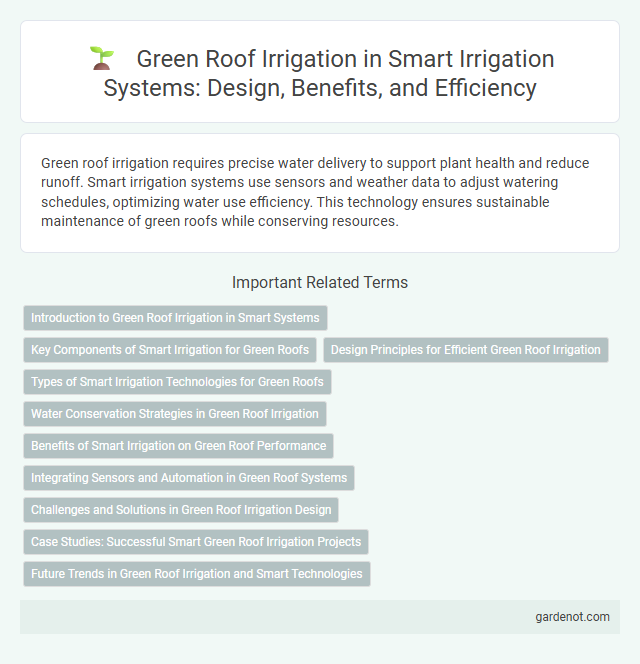Green roof irrigation requires precise water delivery to support plant health and reduce runoff. Smart irrigation systems use sensors and weather data to adjust watering schedules, optimizing water use efficiency. This technology ensures sustainable maintenance of green roofs while conserving resources.
Introduction to Green Roof Irrigation in Smart Systems
Green roof irrigation in smart systems integrates sensor technology and automated watering schedules to optimize water use and promote plant health. These systems monitor soil moisture, temperature, and weather conditions to deliver precise irrigation tailored to the green roof's needs. By reducing water waste and enhancing plant growth, smart green roof irrigation contributes to urban sustainability and energy efficiency.
Key Components of Smart Irrigation for Green Roofs
Key components of smart irrigation for green roofs include soil moisture sensors, weather-based controllers, and drip irrigation systems. Soil moisture sensors provide real-time data to optimize water use by detecting the precise hydration needs of the vegetation. Weather-based controllers adjust irrigation schedules based on local climate data, while drip irrigation systems ensure efficient water delivery directly to the plant roots, minimizing runoff and evaporation.
Design Principles for Efficient Green Roof Irrigation
Efficient green roof irrigation design prioritizes drought-resistant plant selection and optimized substrate composition to enhance water retention and minimize runoff. Integrating drip irrigation systems calibrated for precise water delivery reduces waste and supports sustainable water use. Incorporating rainfall sensors and automated controllers ensures adaptation to varying weather conditions, promoting plant health while conserving resources.
Types of Smart Irrigation Technologies for Green Roofs
Green roof irrigation utilizes advanced smart irrigation technologies such as soil moisture sensors, automated drip irrigation systems, and weather-based controllers to optimize water usage. These technologies monitor real-time environmental conditions and adjust watering schedules accordingly, enhancing plant health and reducing water waste. Integration of IoT devices allows precise control and remote management, ensuring sustainable irrigation for green roof ecosystems.
Water Conservation Strategies in Green Roof Irrigation
Green roof irrigation employs advanced water conservation strategies such as drip irrigation and moisture sensors to optimize water use efficiency, reducing runoff and evaporation. Utilizing drought-tolerant plant species and capturing rainwater through permeable substrates further minimizes irrigation needs. These techniques collectively enhance sustainability by conserving water while maintaining healthy green roof ecosystems.
Benefits of Smart Irrigation on Green Roof Performance
Smart irrigation systems enhance green roof performance by precisely regulating water usage, reducing waste, and promoting optimal plant health in variable climatic conditions. Sensors monitor soil moisture and weather patterns, enabling automated watering schedules that maximize water efficiency and minimize runoff. This technology extends vegetation lifespan, improves thermal insulation, and supports urban sustainability through effective resource management.
Integrating Sensors and Automation in Green Roof Systems
Integrating sensors and automation in green roof irrigation optimizes water usage by continuously monitoring soil moisture levels, temperature, and plant health. Automated systems adjust irrigation schedules in real-time, ensuring precise water delivery that promotes plant growth while minimizing waste. Sensor-driven irrigation technology enhances sustainability and reduces maintenance costs for green roof ecosystems.
Challenges and Solutions in Green Roof Irrigation Design
Green roof irrigation faces challenges such as limited water retention capacity, uneven moisture distribution, and high evaporation rates due to exposure and shallow substrates. Solutions include integrating smart irrigation systems with soil moisture sensors and automated drip irrigation to optimize water use and maintain ideal moisture levels. Utilizing drought-resistant plants and water-efficient scheduling further enhances sustainability and reduces water wastage in green roof environments.
Case Studies: Successful Smart Green Roof Irrigation Projects
Case studies of successful smart green roof irrigation projects demonstrate significant water savings and improved plant health through precise, sensor-driven watering schedules. In urban environments, these systems integrate soil moisture sensors and weather data analytics to optimize irrigation, reducing water usage by up to 40% while enhancing green roof sustainability. Notable examples include the Chicago City Hall green roof and Singapore's NUS campus, where smart irrigation technology has contributed to increased thermal regulation and biodiversity.
Future Trends in Green Roof Irrigation and Smart Technologies
Future trends in green roof irrigation emphasize the integration of smart technologies such as IoT sensors, AI-driven water management systems, and automated drip irrigation to optimize water usage and promote plant health. Advanced sensor networks monitor soil moisture, weather conditions, and plant stress in real-time, enabling precise irrigation scheduling that reduces water waste and supports sustainable urban ecosystems. Emerging innovations also include the use of data analytics and machine learning algorithms to predict irrigation needs and enhance system efficiency for green roofs in diverse climates.
Green roof irrigation Infographic

 gardenot.com
gardenot.com